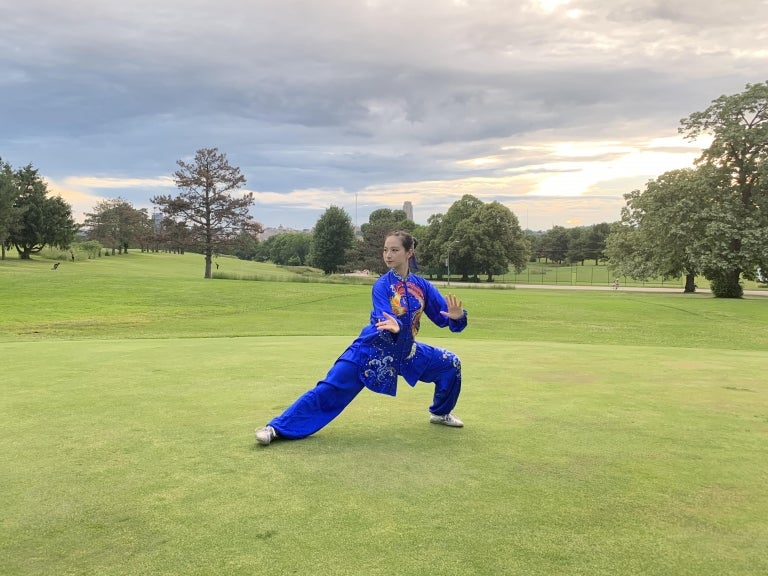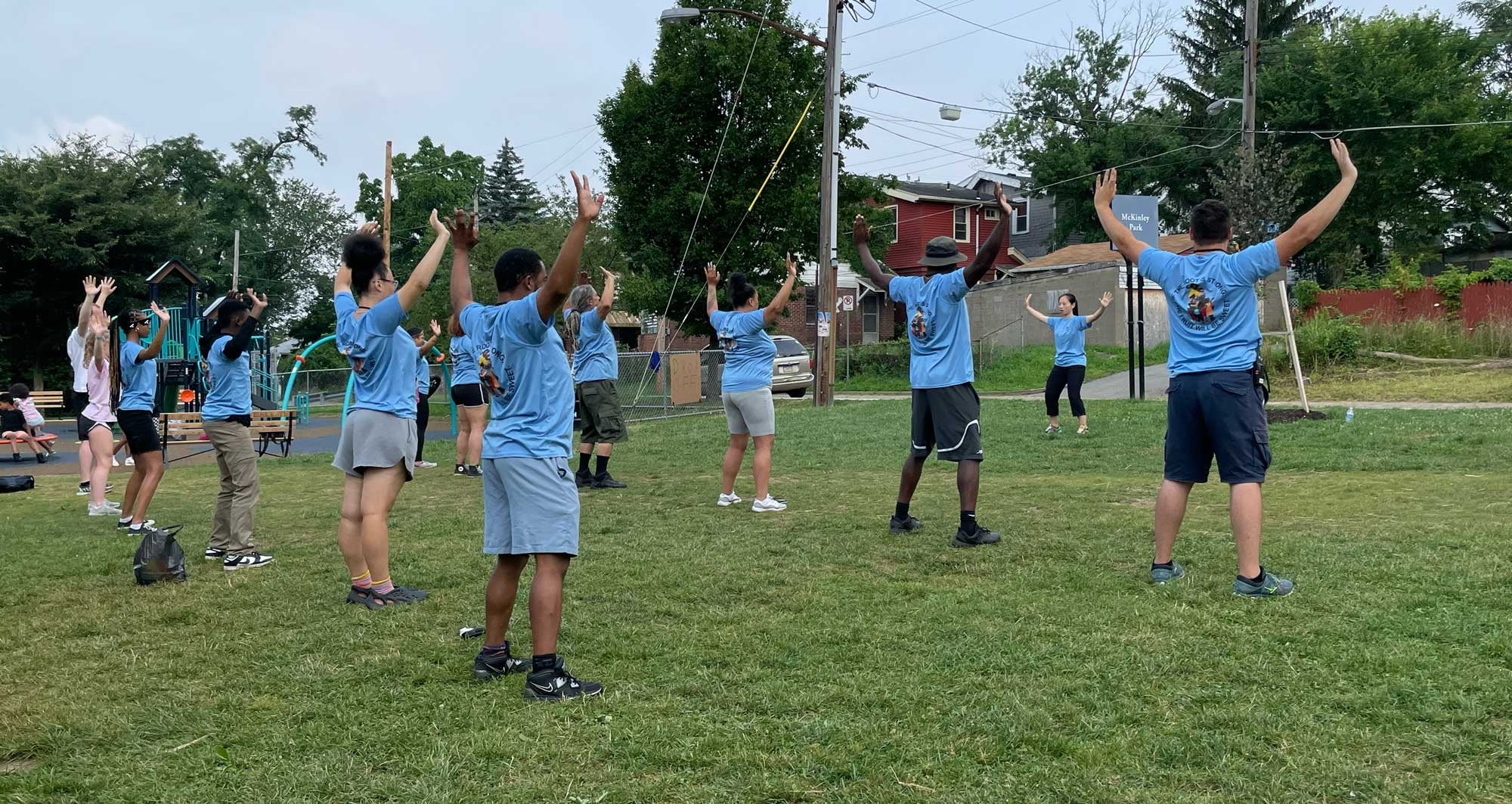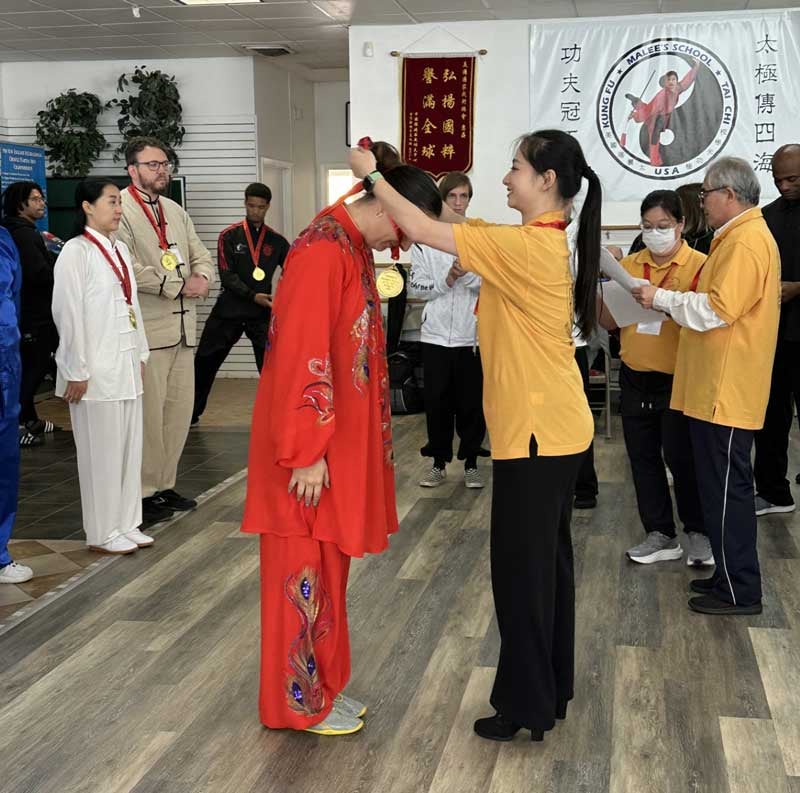
Mengjun (Kate) Wang practicing tai chi for an instructional video in Schenley Park.
“The Bridging the Gaps (BTG) program has been a cornerstone for change and learning, offering me an immersive experience in community service while directly impacting underserved communities,” said Mengjun (Kate) Wang, a second-year Sports Medicine student.
Wang referred to her involvement with the BTG Internship this summer as a “transformational journey” after the School of Health and Rehabilitation Sciences (SHRS) had its first-ever involvement with the program, organized by Pitt’s School of Public Health.
The BTG program enables students to work with underserved communities to gain a better understanding of their health needs and barriers. Interns are paired with other health sciences students to complete a project of their choosing that serves the underrepresented population they would like to work with. Wang, who lived in China until 2019, thought the BTG program would provide her greater insight into American health customs and culture.
“I joined the BTG program to gain a deeper understanding of America, its communities, the daily lives of its people and their health situations,” Wang said. “When choosing a site, I was drawn to locations open to all learning opportunities and populations.”
Wang partnered with Mary Ross, a second-year master's in public health student, during the internship and the two decided to collaborate with the Voices Against Violence (VAV) organization to focus on providing support for youth involved with gangs, drugs and guns in South Pittsburgh communities. VAV’s mission is to effectively and proactively reduce interpersonal conflict among youth through prevention programs.

Wang teaching tai chi to Voices Against Violence in the morning.
During her time at Voices Against Violence, Wang taught both children and adults Chinese martial arts. However, the primary project that she and Ross implemented, titled “Harmony Within: Tai Chi for Employee Well-being," aimed to increase the emotional well-being of employees at VAV through tai chi lessons.
Wang performing at the Pittsburgh Zoo for the Asian Lantern Festival.
Wang chose tai chi due to her in-depth experience as a seasoned martial artist, coach and referee. She has obtained world championships and national titles, performing in numerous countries. Her experience in the field and her knowledge of its therapeutic benefits influenced her decision to integrate it into her Bridging the Gap project.
“Chinese martial arts hold a special place in my heart,” Wang said. “I felt immense joy and pride in being able to harness my expertise for the benefit of the community during this internship. This unique intersection of my passion for martial arts and the opportunity to contribute positively to the community made the experience deeply rewarding.”

Last year at the U.S. A National Traditional Kungfu Team Trials, Wang served as a judge and awarded medals to the first place selected U.S. Traditional Wushu National Team member.
Wang’s “Harmony Within” project intended to provide Voices Against Violence employees with a holistic health experience – using tai chi to reduce stress levels and increase focus.
The project was proven successful among the participants. Wang utilized the Connor-Davidson Resilience Scale to gauge the impact of the tai chi course. The responses, Wang said, helped her to reach profound goals as she continues through the Sports Medicine program.
“The positive feedback, ranging from organizers to counselors, was heartening,” Wang said. “Their anonymous reviews indicated a notable enhancement in their resilience, further underscoring the program's success and its potential contribution to my future in Sports Medicine.”
Wang expressed her hopes to intersect both Eastern traditional wellness practices with Western scientific approaches to health, integrating tai chi in her pursuit of her Sports Medicine career.
“I envision a future where individuals benefit from a seamless blend of both worlds – drawing strength, balance and flexibility from practices like tai chi, and then optimizing those benefits with evidence-based strategies from Sports Medicine,” Wang said. “It's an exciting path, and I genuinely believe that this integrative approach can bring about significant benefits for individuals' physical and mental health.”
Wang and Ross’ efforts also earned them a slot in the final presentations for the Bridging the Gap internship and an honorary trophy from Voices Against Violence in recognition of their contributions.
“Through this journey, I recognized the pivotal role educational resources play in community development,” Wang said. “Engaging with children taught me the profound value of patience and respect, two qualities that are indispensable in the field of Sports Medicine. Furthermore, teaming up with fellow students from different disciplines was an enriching experience, as our combined efforts sought to bring transformative changes to VAV.”
Upon completing the internship, Wang said the experience met her expectations and helped her to achieve her personal and professional goals.
“The two-month internship was incredibly eye-opening for me,” Wang said. The entire experience helped me fulfill my initial objective of joining Bridging the Gap, which was to immerse myself in and understand American culture and its diverse communities better.”
---
Want to learn more about Sports Medicine at SHRS? You can visit the program page to learn more or reach out to an enrollment specialist now at enroll@shrs.pitt.edu.
---
Published October 17, 2023

